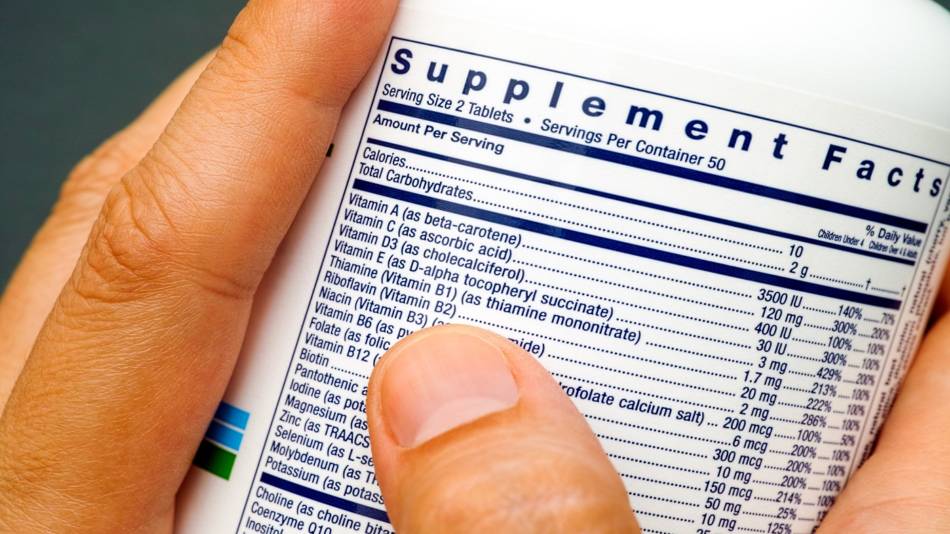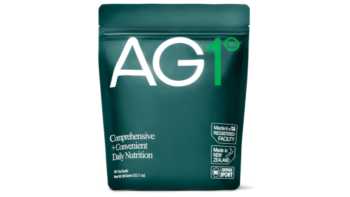
Answer:
It's very easy to buy the wrong product when shopping for a vitamin or supplement.
At ConsumerLab.com, we've purchased, tested, and carefully reviewed the labels of more than 6,000 dietary supplements and found problems with more than 20% of them. We've seen just about every type of problem that can occur with vitamin, mineral, herbal, oil, and other types of supplements, as well as with nutrition powders, drinks, bars and various health foods.
Based on our experience, below are the top eight red flags that our experts think you should watch out for when buying vitamins and other supplements.
Of course, products with none of these red flags can still have been improperly made, mislabeled, contaminated, spoiled, or provide pills that won't properly break apart. You won't know this without laboratory testing like the type we do in for our product reviews, which you should also consider using to help you avoid problems and choose the right supplement.
1. Labels that don't tell you how much you're getting
There are several situations where this can happen:
- "Proprietary blends," "proprietary formulas," and "complexes" may be named to sound like one of the primary ingredients you want, but may contain little of that ingredient.
Proprietary blends and formulas, as well as complexes, are often developed around an expensive ingredient because this allows a company to use less of that ingredient, creating a formula in which the expensive ingredient is just a small part of the formula. We have seen this with ingredients such as CoQ10, curcumin, SAMe, and chondroitin in joint supplements.
We also see proprietary formulas marketed for uses such as cognition, nerve pain, or weight management where a company may try to impress the consumer with a laundry list of ingredients having only shreds of evidence relating to the intended use. In most cases, the formulas themselves have not been clinically tested.
Be sure to look for products that show the amount of each ingredient. This will also help you determine which ingredients seem to help you and which don't.
-
Minerals are unstable by themselves and need to be stabilized in supplements as "salts," meaning they are chemically bound to another compound. This is not a problem, but the majority of the weight of these salts can often be the other compound and not the mineral. For example, only 14% of magnesium bisglycinate is magnesium and only 11% of magnesium citrate is magnesium. This doesn't mean these aren't good forms of magnesium, but it is important that a label tell you exactly how much of the mineral you are getting. For example, a good label may read "Magnesium (as magnesium citrate) 110 mg," so you know that you're getting 110 mg. A misleading label for the same product may read "Magnesium citrate 1,000 mg," leading you to believe that you're getting a lot more magnesium than the 110 mg it provides (since the remaining 890 mg is citrate and not magnesium). A similar problem exists when trying to get choline from supplements.
- When people buy fish oil, they really want the omega-3 fatty acids, not the rest of the oil, but the concentration of omega-3s can range from about 25% to 90% of the fish oil. Prescription fish oils, for example, are closer to 90% omega-3s. A supplement that claims "1200 mg" of fish oil, may provide just 300 mg of omega-3s. If you're trying to get a high dose of omega-3s, you'll need to take a lot of extra pills or oil. So, when buying fish oil, don't focus on the amount of fish oil, but on the amount of omega-3 fatty acids or, better yet, on the amounts of the two key omega-3s, EPA and DHA. This will also show you the ratio of EPA to DHA, which can be important for certain uses.
- Clinical studies involving herbs typically use herbal ingredients, such as extracts, standardized to provide specific amounts of key natural compounds. But labels often don't provide these details. For example, 200 mg of a turmeric extract may contain as little as 36 mg of curcumin or nearly all of it could be curcumin. A good label will show how concentrated an herbal ingredient is by listing the amount of at least one key compound or its percentage of the total extract or herb. If you don't know what to look for in a specific herb, or the proper dose, ConsumerLab gives you the details in its herbal supplement product reviews.
2. Meaningless claims
Some of the claims that you see on supplements are just meaningless. Common examples are:
- "Contains clinically tested ingredients"
This claim is meaningless for many reasons. First, just because an ingredient has been clinically "tested" does not mean it has been clinically "proven" to work. Even if an ingredient has been proven to work, the product may not contain the right amount of ingredient, or suggest the correct dosing. Furthermore, a supplement may contain a combination of ingredients that have never been tested together, so it is not known if the combination will work even if there is good evidence for one or more of its components.
- Tested by an "FDA Approved Laboratory"
If a supplement claims to have been tested in an "FDA Approved" laboratory, don't believe it: The FDA does not approve laboratories. However, a laboratory can "register" with the FDA and there are additional meaningful laboratory accreditations. More details are available here.
- "Pharmaceutical Grade"
There is no such thing as "pharmaceutical grade" for most supplement ingredients. There is no reason to pay more if you see this meaningless term. However, a manufacturer is allowed to claim that an ingredient meets a standard set by U.S. Pharmacopeial Convention (USP), if such a standard exists. ConsumerLab typically applies USP standards to its testing of supplements.
3. Claims to treat or cure a disease
Supplements are not legally considered drugs and cannot claim to treat, cure, or diagnose a disease. So be very wary of products that make such claims.
In specific circumstances where there is significant scientific agreement, claims can be made regarding the ability of a food or supplement to reduce the risk of a disease. These authorized health claims are currently limited, among supplements, to calcium and vitamin D for osteoporosis, folate for neural tube defects, stanols/sterols for heart disease, and soluble fiber (including that from psyllium husk) for heart disease.
When there is more limited or little scientific evidence, on a case-by-case basis, supplements can make qualified health claims regarding disease risk reduction if these have been reviewed and evaluated by the FDA prior to use and are accompanied by disclaimers regarding the level of scientific evidence. An example is that psyllium husk, based on very limited evidence, may reduce the risk of type 2 diabetes. Another example is that EPA and DHA may reduce the risk of coronary heart disease by lowering blood pressure, based on evidence that is inconsistent and inconclusive.
Supplements can also make more vague claims as to how they act to maintain the structure or function of the human body, with a disclaimer that the FDA has not evaluated the claim. A manufacturer must have substantiation that the claim is truthful and not misleading and must submit a notification of the claim to the FDA. These types of claims are very common on supplements, but keep in mind that the FDA does not evaluate them or the documentation supposedly behind them.
4. Gummy formulas
Some ingredients are less stable in gummies than in tablets and capsules, leading to faster loss of potency in gummies. If this is not problem enough, to accommodate manufacturers (who are legally required to provide at least 100% of each claimed ingredient during the shelf life of a product), the USP holds gummies to looser standards than tablets and capsules. For example, gummy multivitamins are permitted to contain 245% of their folate and 250% of their vitamin C and still meet USP requirements, while tablets and capsules can have only 50% more than listed. We don’t think this is in the best interest of consumers, so ConsumerLab holds gummies to the same, higher, standards of pills and capsules.
5. Getting too much of an ingredient without realizing it
Supplement labels are not required to disclose when the amount of an ingredient may pose a risk of harm, and most won't disclose this voluntarily. Be wary when a vitamin or mineral is listed at more than 100% of the Daily Value (DV), as this is more than you normally need from your entire diet and it may be too much. The Daily Value is based on the maximum requirement across the general population, but your requirement may be less.
Upper limits, technically known as Tolerable Upper Intake Levels or ULs, exist for most vitamins and minerals but are not shown on labels. Before taking a vitamin or mineral supplement, be sure that you're not exceeding a UL unless you are treating a deficiency or taking the supplement for some other conditions for which it is medically necessary. You can look up nutritional requirements and limits by age, gender, and life stage on our free table of nutritional requirements.
6. Uncertain certification
Even companies that try to do the right thing can make mistakes and not know it. That's why it is important to make sure that a product has been properly tested. It's best if this testing is done by an independent, reputable third party like ConsumerLab.com or others such as USP or NSF. Don't rely on products that simply claim to be "Quality Tested" or even "Third-Party Tested" if the third party is not identified. Look for certification marks, such as ConsumerLab.com's "Approved Quality" seal that specifies what was being tested.
Also see our product reviews to learn which products have passed our tests — you'll also see which products failed among those we selected for testing.
7. High prices — They don't mean better quality
ConsumerLab's tests frequently show that some of the best quality products are not the most expensive ones. Some of the highest-priced supplements are among those that have failed our testing. Often (but not always), big retailers or wholesalers have very good store-brand products at low cost due to their high volume and ability to hold manufacturers to high standards. Supplements can be expensive, so why pay more than you have to? To help in this regard, ConsumerLab's product reviews include price comparisons we factor cost into the selections of our Top Picks.
8. Only Sold on Amazon — Counterfeits and Poor Quality Found
While many good products are sold on Amazon and Walmart.com, there have been reports of counterfeit supplements and products (typically from lesser-known brands) containing only a small fraction of their listed ingredients. See our tips on how to avoid counterfeit supplements online and see the following Product Reviews for how specific supplements (by brand) purchased on Amazon and/or Walmart.com have fared when tested: Astaxanthin, Berberine, Bromelain, Glutathione, Magnesium, NMN, Resveratrol, SAMe, Quercetin, and Turmeric/Curcumin. Problems have also been reported with Elderberry, Galantamine, and Immune Support supplements sold on Amazon and/or Walmart.com.
Bottom Line — Buyer Beware
Before you buy are vitamin or other supplement, check for the red flags above to make sure the product at least promises to give you what you want. While you still can't be sure that what's in the bottle matches what's on the label, you'll have avoided many common problems. To find out what's really a supplement, check ConsumerLab's product reviews.
Join today to unlock all member benefits including full access to all CL Answers and over 1,400 reviews.
Join NowAlready a member? Sign In Here.
Join now at www.consumerlab.com/join/







Submit your comment
This feature is restricted to active members.
Join now to add comments and get all member benefits, including over 1,400 reviews.
Join NowAlready a member? Sign in here.